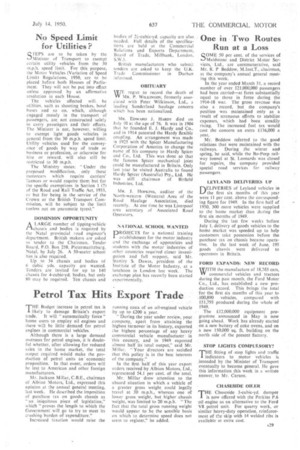Petrol Tax Hits Export Trade
Page 31

If you've noticed an error in this article please click here to report it so we can fix it.
THE Budget increase in petrol tax is likely to' damage Britain's export trade. It will "automatically force" home users to employ oil engines and there will be littledemand for petrol
engines in commercial 'vehicles. • ' Although there is a large demand overseas for petrol engines, it is doubtful whether, after allowing for reduced sales in the home market, the total output recniired would make the production of petrol units an 'economic proposition. In that event, orders will be lost to American and other foreign manufacturers.
Mr. Jackson Millar, C.B.E., chairman of Albion Motors, Ltd., expressed this opinion at the annual genetat meeting, last week. He described the imposition of purchase tax on goods chassis as an iniquitous piece of legislation," which "proves the length to which the Government will go to try to meet its crushing biirden of expenditure."
Increased taxation would raise the running costs of an oil-engined vehicle by up to. £200 a year. . " During the year under review, your company, apart from attaining the .highest tUrnover in its history, exported the highest percentage of any heavy commercial vehicle manufacturerin 'this country, and in 1949 exported almost half its total output," said Mr.
.Millar. Your directors are satisfied that this policy is in the best interests of the company."
In the first half of this year export orders received by Albion Motors, Ltd., represented 54.1 per cent, of the total.
Mr. Millar drew attention to the absurd situation in which a vehicle of a greater gross weight could legally travel at 30 m.p.h., whereas one of lower gross weight, but higher chassis weight, was limited to 2.0 m.p.h. "The fact that the total gross running weight would appear to be the sensible basis on which to determine speed does not seem to register," he added.












































































